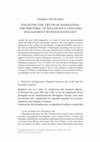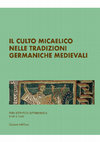Papers by Federica Di Giuseppe

Filologia Germanica 16, 2024
Around the year 1000, England is in a state of crisis and demoralisation which most likely foster... more Around the year 1000, England is in a state of crisis and demoralisation which most likely fosters apocalyptic anxieties. The preoccupation becomes prominent in the writings of contemporary vernacular homilists, and plays a key role in Archbishop Wulfstan’s eschatological preaching. By focusing on his use of the list of sinners, this paper illustrates the evolution of Wulfstan’s apocalypticism throughout his career, from ideological conviction to rhetorical tool. In particular, I intend to focus on how the alliterating catalogue, which first appears in De Fide Catholica (Bethurum sermon no. 7, p. 163 and ll. 128-134), is then reworked not only in the longest version of the Sermo Lupi ad Anglos(Bethurum sermon no. 20, p. 273 and ll. 161-166) but also in Wulfstan’s legal writings and political tracts (in which case the list comes to describe earthly sinners, namely criminals proper). The way the catalogue is rephrased signals a change in Wulfstan’s eschatological tone, which is ever-present but still loses its immediacy as the years, his career and the Viking invasions wear on.

Feeding the Dragon. An Eschatological Motif in Medieval Europe , 2023
This paper proposes to illustrate how Ælfric avails himself of motifs
which are commonly used in ... more This paper proposes to illustrate how Ælfric avails himself of motifs
which are commonly used in descriptions of hell and death and how he
exposes his eschatological concerns by means of fyr and wyrm, the latter being continually linked to the condition of the body and the soul before and after Judgement. Giving a brief overview of the use of wyrm within Ælfric’s corpus, special emphasis will be on how the word is employed when he engages with descriptions of divine judgement. The discussion will then focus on three works where Ælfric’s imagery of hell includes both the worm and the fire, namely the Homily for the Third Sunday after the Epiphany (CH I. 8), the homily On Auguries (LS 17), and the Passion of St Julian and his wife Basilissa (LS 4; Upchurch 2007, 54-71). These compositions are the only ones in his corpus where the eternal fire joins the immortal worm in the depiction of the infernal industry. Moreover, they show how Ælfric’s need to warn his audience about the coming Judgement may well feature both the Worm of hell and the maggots devouring the flesh, which his hearers and readers would certainly know from everyday life.

Endzeitvorstellungen. Die Interkulturalität des apokalyptischen Mythos im lateinischen und germanischen Mittelalter, 2022
Society undergoes a profound change throughout Europe at the turn of the millennium, so abrupt th... more Society undergoes a profound change throughout Europe at the turn of the millennium, so abrupt that it could well pass for a revolution proper. This phenomenon affects England as well, where transformative forces disrupt the traditional social order and are accelerated by the several crises occurring in the country between the ninth and the eleventh century. In view of his interest in proper societal organisation, Archbishop Wulfstan of York is exercised by the catastrophes of the time, and he sees the resulting social chaos as a sign of the impending end of the world. Consequently, his works abound in references to the need for repentance and national reform in preparation for the Last Judgement. Wulfstan’s project to build a Holy Society pleasing to God seems all the more possible in Cnut’s reign, when England is apparently at peace and the AngloDanish establishment becomes a chance for a fresh start. With this in mind, the present paper aims at showing how Wulfstan’s activity as a statesman blends his concern with social order and the urgency for his people to redeem themselves from the sins that caused the downfall of the nation. In doing this, the focus will be on the political and legal texts where Wulfstan’s eschatological anxieties merge with his desire to realise a properly ordered Christian community, namely the Institutes of Polity and I–II Cnut.
Conference Presentations by Federica Di Giuseppe
Della pena che non sia solo pena: qualcosa di nuovo sul fronte carcere?, 2024
La presentazione è stata tenuta nell'ambito del ciclo di conferenze organizzate dalla Scuola Supe... more La presentazione è stata tenuta nell'ambito del ciclo di conferenze organizzate dalla Scuola Superiore Universitaria di Toppo Wassermann (Università degli Studi di Udine). Il titolo del ciclo è "Della pena che non sia solo pena: qualcosa di nuovo sul fronte carcere?".
L'intervento tratta dell'istituzione del "carcere" in Inghilterra altomedievale e, più nello specifico, offre una panoramica interdisciplinare al fine di dimostrarne esistenza e usi nella società medievale inglese. A tal fine, saranno presentate una serie di testimonianze, da quelle lessicali a quelle narrative, da quelle storiche a quelle artistiche e archeologiche.

FAITES VOS JEUX. Game and space in texts and of texts, 2023
This paper surveys the role of wordplay within Germanic literary tradition from the Middle Ages, ... more This paper surveys the role of wordplay within Germanic literary tradition from the Middle Ages, focusing on Early Medieval England and especially on Wulfstan Archbishop of York's homiletic and political corpus. Particular attention will be devoted to a specific aspect of Wulfstan's writing, namely the lists of sinners. These lists provide a good example of the Archbishop's ability in playing with words and sounds so as to convey a clear message concerning the Last Times. In analysing single occurrances within Wulfstan's lists of sinners, his relationship with the oral-formulaic Germanic tradition on the one hand, and with the Latin tradition of classical rhetoric on the other hand will be reviewed.
The conference has been organised by me and the PhD students of the XXXVI cycle within the doctoral programme in 'Linguistic and Literary Studies' (University of Udine/University of Trieste).

32nd International Conference of the Spanish Society for Medieval English Languages and Literature (SELIM), 2022
Within the context of the Old English literary corpus, hengen has drawn scholarly attention in re... more Within the context of the Old English literary corpus, hengen has drawn scholarly attention in recent years due to its ambiguous meaning, ranging from ‘torture by hanging’ and ‘prison, confinement’ to ‘that to which any one is attached so as to be punished’. The word occurs in Ælfric’s hagiographies, where it stands for an instrument of torture used to torment the saints in scenes of martyrdom, be it a rack, a cross or gallows. Besides, *wǣpen-hengen might well be the solution to the Exeter Book Riddle 55, as it skilfully suggests the idea of a wooden structure used to hang and store weapons. Similarly, Riddle 56 most likely features a different kind of hengen, the loom, which would imply a connection between the stretched fabric and the image of a man being stretched out on a rack as a form of judicial punishment. Indeed, hengen features in vernacular laws (Af 35.2, II Cnut 35) and compositions concerning social organisation (Griđ 16), but it occurs in post-Conquest legal compilations as well. In this case, while the OE term appears in Leges Henrici 65.5, the word is also translated into Latin as in carcanno/in suspendio (Quadripartibus), subeat captionem regis (Instituta Cnuti) and subeat suspendium (Consiliatio Cnuti). The present discussion will give an overview of the semantic range of hengen, with special emphasis on its occurrences in the legal and political corpus. In particular, I will try to outline the shifts in the meaning of the word in pre- and post-Conquest laws and tracts, explaining whether hengen stands for ‘imprisonment’ both before and after the Norman occupation of England, or whether it points to a much more severe sentence, even involving torture. Moreover, cognates of OE hengen in other Germanic languages will be mentioned, comparatively analysing their meanings and contexts of use.

Immagini della fine dei tempi (Endzeitvorstellungen), 2021
Society undergoes a profound change throughout Europe at the turn of the millennium, so abrupt th... more Society undergoes a profound change throughout Europe at the turn of the millennium, so abrupt that it could well pass for a revolution proper. This phenomenon affects England as well, where transformative forces disrupt the traditional social order and are accelerated by the several crises occurring in the country between the ninth and the eleventh century. In view of his interest in proper societal organisation, Archbishop Wulfstan of York is exercised by the catastrophes of the time, and he sees the resulting social chaos as a sign of the impending end of the world. Consequently, his works abound in references to the need for repentance and national reform in preparation for the Last Judgement. Wulfstan’s project to build a Holy Society pleasing to God seems all the more possible in Cnut’s reign, when England is apparently at peace and the AngloDanish establishment becomes a chance for a fresh start. With this in mind, the present paper aims at showing how Wulfstan’s activity as a statesman blends his concern with social order and the urgency for his people to redeem themselves from the sins that caused the downfall of the nation. In doing this, the focus will be on the political and legal texts where Wulfstan’s eschatological anxieties merge with his desire to realise a properly ordered Christian community, namely the Institutes of Polity and I–II Cnut.
The paper given at this conference has been developed into a publication proper.

57th International Congress on Medieval Studies, 2022
Between the ninth and the eleventh centuries, England experiences several episodes of invasions, ... more Between the ninth and the eleventh centuries, England experiences several episodes of invasions, internal mobility and changes of regime. Many Northerners have already settled in areas north and east of Watling Street at the beginning of the tenth century, and their occupation is then followed by the Danish conquest under kings Sweyn and Cnut. Within this context, legislation shows awareness of the evolving Anglo-Scandinavian dimension and it bears witness to different attitudes towards incoming new identities. The present discussion will deal with the ways the legal tradition is shaped so as to address the role of strangers in Early Medieval England. Indeed, though usually posing a threat to the English society as a whole, special measures are taken for those who lack local connections (whether they come from afar or have been exiled from the community). The focus will be on Wulfstan’s legal corpus and, more specifically, on a clause concerning the king’s jurisdiction over assaults on clerics and foreigners which occurs in II Cnut 40, VIII Æthelred 33, 12 EGu and 8 Ranks. The premises at the basis of the clause will be discussed and analysed: on the one hand, protection of foreigners and hospitality are essential elements of a good Christian conduct; on the other hand, Wulfstan’s several references to strangers and the Danelaw may well point to him trying to accommodate Danish practices and to nurture cultural unification. The present paper will argue that Wulfstan’s attempt at realising a properly ordered Christian society merges with his recognition of the ‘Danishness’ of eastern and northern England, while acknowledging the importance of Cnut’s regime in prompting peace and stability between the English and the Danes.
XXI Seminario Avanzato in Filologia Germanica, 2021
This presentation deals with a brief and short survey analysing the concept of Christian evil wit... more This presentation deals with a brief and short survey analysing the concept of Christian evil within the Anglo-Danish legislative corpus drafted by Archbishop Wulfstan of York for Cnut the Great.
Apocalypse and Revelation. A MARGIN Graduate Symposium, 2021
Conversion to Christianity turns sexuality into an obstacle to spiritual perfection . In early me... more Conversion to Christianity turns sexuality into an obstacle to spiritual perfection . In early medieval England, Ælfric and Wulfstan are clearly influenced by this approach: within their theology, virginity and sexual abstinence hold great importance in the economy of salvation, and they blend with the desire to build a Christian ordered society in preparation for th e Last Judgement. This paper aims at giving an overview of the role that sexual behaviours have in Ælfric’s and Wulfstan’s idea of ordered society , exploring its eschatological implications . The focus will be on Ælfric’s homily on the Purification of st. Mary (CH I.9) and Wulfstan’s work as a statesman, especially the Institutes of Polity and his legislation under Cnut.
Conference organisations by Federica Di Giuseppe
Ciclo di conferenze organizzate dalla Scuola Superiore Universitaria di Toppo Wassermann (Univers... more Ciclo di conferenze organizzate dalla Scuola Superiore Universitaria di Toppo Wassermann (Università degli Studi di Udine).
The conference organised by the PhD course in Linguistic and Literary Studies (XXXVI cycle) of th... more The conference organised by the PhD course in Linguistic and Literary Studies (XXXVI cycle) of the Universities of Udine and Trieste (Italy) aims at bringing together young students and researchers to explore the concept of 'play/game' in and of texts. During the three-day conference, participants will reflect and analyse how the concepts of 'play/game' and 'space' interact and contribute to the construction of meanings in literary, linguistic as well as philological and medieval studies.
Naples, 6-7 June 2023.
The conference is mainly concerned with declinations of the renowned oppos... more Naples, 6-7 June 2023.
The conference is mainly concerned with declinations of the renowned opposition between good and evil within the Medieval Germanic tradition. The topic will be addressed through a lexical as well as historical and literary point of view, offering an overview of how the two concepts feature in corpora belonging to different Germanic languages.
Books by Federica Di Giuseppe

Atti del XXI Seminario Avanzato in Filologia Germanica, 2023
This volume collects papers presented during the XXI Advanced Seminar in Germanic Philology (Univ... more This volume collects papers presented during the XXI Advanced Seminar in Germanic Philology (University of Turin, 20-22 September 2021) and is dedicated to the genesis and fortune of the cult of Michael the Archangel in Lombard, English, German, Scandinavian, and medieval Latin traditions. Particular attention is paid to the production of hagiographic, eschatological, soteriological, and commemorative texts in which Michael is invoked with reference to one or more of its functions as psychopomp, purifier, miracle worker, commander of the angelic army, and opponent of Satan. Contributors: Immacolata Aulisa, Alessandro Zironi, Dagmar Gottaschall, Patrizia Lendinara, Claudia Di Sciacca, Raffaele Cioffi, Carla Cucina, Maria Elena Ruggerini, Margaret Cormack and Haukur Þorgeirsson, Matteo De Franco, Federica Di Giuseppe, Alice Fardin, Lidia Francesca Oliva, and Caterina Saracco.










Uploads
Papers by Federica Di Giuseppe
which are commonly used in descriptions of hell and death and how he
exposes his eschatological concerns by means of fyr and wyrm, the latter being continually linked to the condition of the body and the soul before and after Judgement. Giving a brief overview of the use of wyrm within Ælfric’s corpus, special emphasis will be on how the word is employed when he engages with descriptions of divine judgement. The discussion will then focus on three works where Ælfric’s imagery of hell includes both the worm and the fire, namely the Homily for the Third Sunday after the Epiphany (CH I. 8), the homily On Auguries (LS 17), and the Passion of St Julian and his wife Basilissa (LS 4; Upchurch 2007, 54-71). These compositions are the only ones in his corpus where the eternal fire joins the immortal worm in the depiction of the infernal industry. Moreover, they show how Ælfric’s need to warn his audience about the coming Judgement may well feature both the Worm of hell and the maggots devouring the flesh, which his hearers and readers would certainly know from everyday life.
Conference Presentations by Federica Di Giuseppe
L'intervento tratta dell'istituzione del "carcere" in Inghilterra altomedievale e, più nello specifico, offre una panoramica interdisciplinare al fine di dimostrarne esistenza e usi nella società medievale inglese. A tal fine, saranno presentate una serie di testimonianze, da quelle lessicali a quelle narrative, da quelle storiche a quelle artistiche e archeologiche.
The conference has been organised by me and the PhD students of the XXXVI cycle within the doctoral programme in 'Linguistic and Literary Studies' (University of Udine/University of Trieste).
The paper given at this conference has been developed into a publication proper.
Conference organisations by Federica Di Giuseppe
The conference is mainly concerned with declinations of the renowned opposition between good and evil within the Medieval Germanic tradition. The topic will be addressed through a lexical as well as historical and literary point of view, offering an overview of how the two concepts feature in corpora belonging to different Germanic languages.
Books by Federica Di Giuseppe
which are commonly used in descriptions of hell and death and how he
exposes his eschatological concerns by means of fyr and wyrm, the latter being continually linked to the condition of the body and the soul before and after Judgement. Giving a brief overview of the use of wyrm within Ælfric’s corpus, special emphasis will be on how the word is employed when he engages with descriptions of divine judgement. The discussion will then focus on three works where Ælfric’s imagery of hell includes both the worm and the fire, namely the Homily for the Third Sunday after the Epiphany (CH I. 8), the homily On Auguries (LS 17), and the Passion of St Julian and his wife Basilissa (LS 4; Upchurch 2007, 54-71). These compositions are the only ones in his corpus where the eternal fire joins the immortal worm in the depiction of the infernal industry. Moreover, they show how Ælfric’s need to warn his audience about the coming Judgement may well feature both the Worm of hell and the maggots devouring the flesh, which his hearers and readers would certainly know from everyday life.
L'intervento tratta dell'istituzione del "carcere" in Inghilterra altomedievale e, più nello specifico, offre una panoramica interdisciplinare al fine di dimostrarne esistenza e usi nella società medievale inglese. A tal fine, saranno presentate una serie di testimonianze, da quelle lessicali a quelle narrative, da quelle storiche a quelle artistiche e archeologiche.
The conference has been organised by me and the PhD students of the XXXVI cycle within the doctoral programme in 'Linguistic and Literary Studies' (University of Udine/University of Trieste).
The paper given at this conference has been developed into a publication proper.
The conference is mainly concerned with declinations of the renowned opposition between good and evil within the Medieval Germanic tradition. The topic will be addressed through a lexical as well as historical and literary point of view, offering an overview of how the two concepts feature in corpora belonging to different Germanic languages.